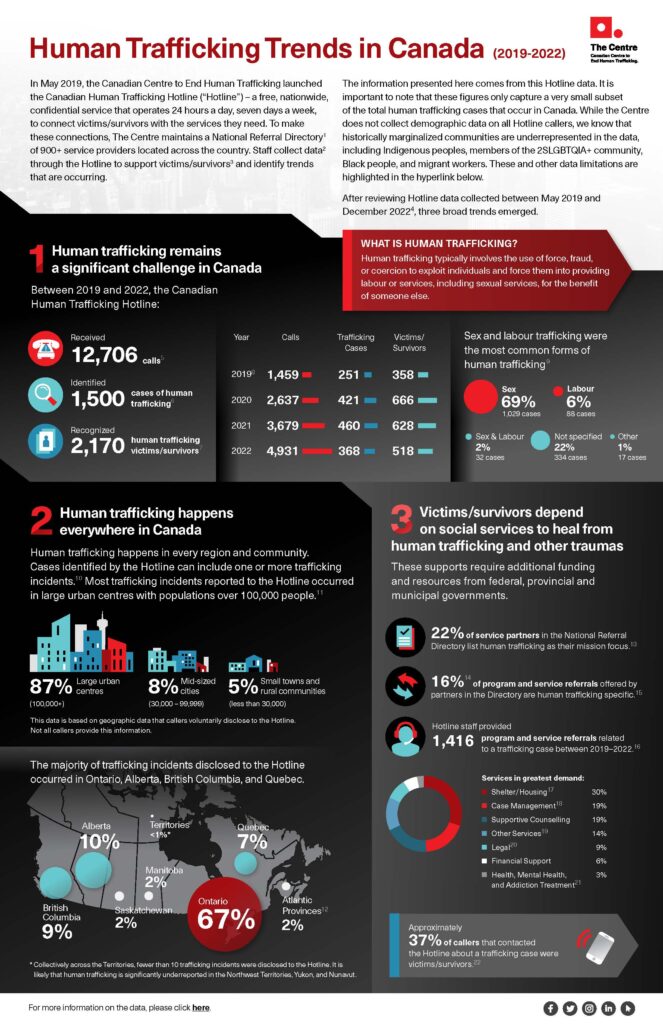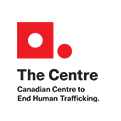Human trafficking remains a significant challenge in Canada, new data reveals
Toronto, Canada, July 27, 2023 – The Canadian Human Trafficking Hotline has identified 1,500 human trafficking cases since its launch in May 2019. Newly released data show that the number of cases has fluctuated between 251 and 460 cases per year. During this time, the Hotline supported 2,170 victims and survivors of human trafficking. Victims/survivors comprised the primary group of callers – approximately 37% – reaching out to the Hotline’s person-centred, confidential service.
While human trafficking happens everywhere in Canada, most trafficking situations disclosed to the Hotline occurred in large urban centres with populations over 100,000 people. Approximately 13% of reported trafficking cases occurred in municipalities with smaller populations. The majority of trafficking incidents disclosed to the Hotline took place in Ontario, Alberta, British Columbia, and Quebec.
Other findings include:
- The Hotline received a total of 12,706 calls and identified 1,500 human trafficking cases between 2019-2022. Call volume has steadily increased year over year.
- Hotline staff provided over 1,400 program and service referrals related to a trafficking case.
- Shelter/housing support was in greatest demand among human trafficking victims and survivors who contacted the Hotline. Case management and supportive counselling were also highly requested in human trafficking situations.
- Sex and labour trafficking were the most common forms of human trafficking in Canada (1,029 cases of sex trafficking and 88 cases of labour trafficking were disclosed). Labour trafficking is likely under-reported in Canada.

While the Hotline doesn’t collect demographic data on all callers, we know that historically marginalized communities are underrepresented in the data, including Indigenous peoples, members of the 2SLGBTQIA+ community, Black people, and migrant workers. Our data is solely based on the information voluntarily provided by the callers.
The data also confirms that victims/survivors depend on social services to heal from human trafficking and other traumas. Hotline staff faced challenges connecting victims and survivors with appropriate support services. Decades of insufficient funding of critical services such as housing – combined with the pressures that COVID-19 placed on Canada’s social safety net – have left service providers struggling to support our country’s at-risk and marginalized populations. What’s more, survivors in rural, northern and remote regions often do not have equal access to services that are vital to their recovery. Additional federal, provincial and municipal investments are desperately needed.
“While only a subset of all human trafficking cases in Canada was captured in our data, we are seeing clear trends occurring across the country,” said Julia Drydyk, Executive Director, The Canadian Centre to End Human Trafficking. “For example, existing services are not enough to help those who come forward and exit their trafficking situation. Healing from trafficking trauma is a complex and difficult journey. Increasing the capacity of front-line organizations to serve victims and survivors of human trafficking can guarantee that no one is left behind. Victims and survivors of human trafficking should have immediate access to the supports they need, regardless of where they are in Canada.”
For more information or to arrange interviews, please contact:
Aziz Froutan
Communications Manager
The Canadian Centre to End Human Trafficking
afroutan@ccteht.ca
647-714-2527
About the Canadian Centre to End Human Trafficking:
The Centre is a national charity dedicated to ending all types of human trafficking in Canada. We work with like-minded stakeholders and organizations, including non-profits, corporations, governments and survivors/victims of human trafficking, to advance best practices, eliminate duplicate efforts across Canada, and enable cross-sectoral coordination by providing access to networks and specialized skills. In 2019, The Centre launched the Canadian Human Trafficking Hotline at 1-833-900-1010, a 24/7, multilingual access to a safe and confidential space to access help and connect to services.
What is human trafficking?
Human trafficking typically involves the use of force, fraud, or coercion to exploit individuals and force them into providing labour or services, including sexual services, for the benefit of someone else.
For more information regarding the information presented in the Human Trafficking Trends in Canada (2019-2022) data or The Canadian Centre to End Human Trafficking, please contact: media@ccteht.ca
